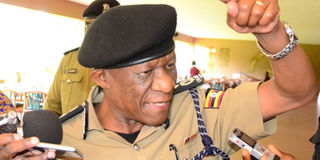Police should stop reckless shooting

The Daily Monitor yesterday carried a story about a 17-year old who was shot dead by police as they disperse a gathering at night.
Relatives and friends had gathered for the last funeral rites of the late Micheal Ejiet. So because it was past curfew time, the police came to disperse the gathering, something that they were right to do.
However, the problem was the violent manner in which they used to confront the crowds by shooting live bullets at them. According to Mr David Ongom Mudong, the East Kyoga regional police spokesperson, the police acted this way because they met resistance from the crowds.
This, however, is not the way we expect the Force to handle chaotic but unarmed residents.
Worse still, this was not the first time this happened. In February, a 19-year-old student was shot by a police constable while he was in class revising.
And in Kapchorwa District, a 16-year-old boy was caught in a crossfire as police and UPDF in a joint operation, went to arrest his father.
These and many similar shooting have occurred in the last few months and point to a trigger-happy Force.
While there are situations that might call for police to defend themselves, and perhaps use gunfire, there are others where the Force could have managed the situation better to avoid loss of lives. It is particularly disheartening to see people shot at even when they were unarmed or were actually fleeing the police.
The Force needs to retrain its officers on the best ways of enforcing law and order. Not all dissent and chaos from the public needs to be dealt with brute force, including shooting to kill.
Proper assessment of the situation needs to be done so that the right number of police officers are sent to calm the situation so as to avoid deploying one or two officers who get overwhelmed when they arrive at a chaotic scene.
The Force should also be trained to have a good working relations with civilians. They should build rapport with communities. They should explain their duties and create an amicable relationship so that whenever they appear, they are not seen as the enemy.
More importantly, the Force commanders should determine what exactly went wrong and why? Besides, the commanders should provide urgent solutions to what can be done going forward to avoid them.
Besides, the Force should mind its image, which is currently dented due to its brutality and work towards correcting it for the good of the country.




